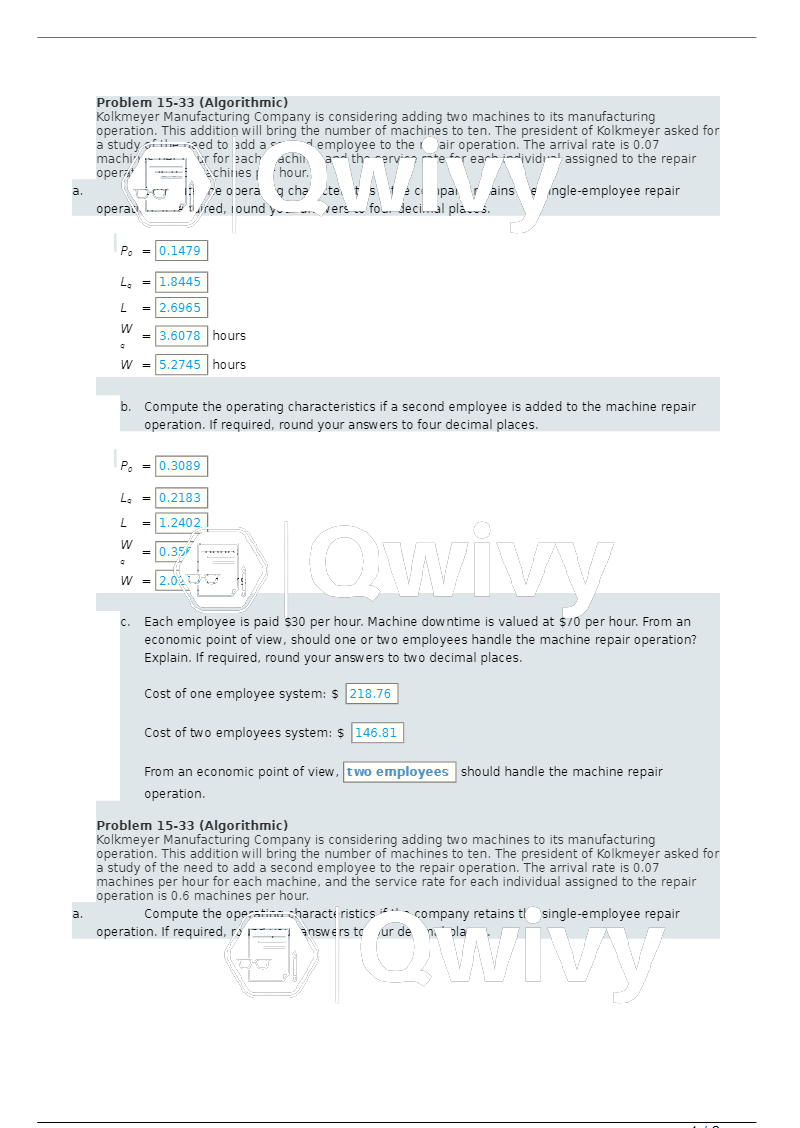
PSY 255 Quiz 2 Chapter 5 and 6 – Question with Answers
1. Freud wrote about all of the following types of anxiety except one. Which one?
A. Reality anxiety
B. Neurotic anxiety
C. Moral anxiety
D.Performance anxiety
2. According to Freud, guilt is most closely associated with
A. reality anxiety.
B. neurotic anxiety.
C.moral anxiety.
D. performance anxiety.
3. Which of the following is true about neurotic anxiety, as conceived by Freud?
A. It is experienced when id impulses are close to breaking into consciousness.
B.It prevents the ego from utilizing defense mechanisms.
C. It is created when id impulses violate society’s moral code.
D. People experiencing neurotic anxiety usually are aware of what is making them
anxious.
4. Researchers often organize the many kinds of coping strategies into categories. One of the
most useful distinctions drawn by these researchers is between _____ and _____ strategies.
A.conscious; unconscious
B. childish; adult
C.active; avoidant
D. primary; secondary
5. Sam is facing a difficult midterm exam and is feeling stressed out about it. As the exam
date approaches and his anxiety increases, Sam starts thinking about ways to study more
effectively. He schedules a large portion of time for active study of the material on the test
so that he is prepared. In terms of coping, which of the following is Sam’s strategy?
A. Avoidance strategy
B. Emotionfocused strategy
C.Problemfocused strategy
D. Repression strategy
6. A friend comes to you with a problem. You determine that there is nothing she can do to
solve the problem but also that it is not going to go away any time soon. According to
research, which type of coping strategy should you recommend?
A.Emotion-focused strategy
B. Problem-focused strategy
1 / 2
C. Avoidant strategy
D. Defensive strategy
7. Which of the following is predicted from the original frustrationaggression hypothesis?
A.Aggression is always caused by frustration.
B. Aggression is sometimes caused by frustration.
C. Frustration is the only one of many causes of aggression.
D. Catharsis always leads to frustration.
8. According to object relations theory, a child’s relationship with his or her parents
A. is not as important as the child’s relationship with peers.
B.affects the way the child thinks of others in future relationships.
C. is more important as the child grows older, especially in the adolescent years.
D. is not as important as neo-Freudian theorists originally claimed.
9. According to research on attachment theory, a mother who is attentive and responsive to
her infant is most likely to develop a ______ relationship with the child.
A.secure
B. anxious-ambivalent
C. avoidant
D. dependent
10. A woman is uncomfortable getting close to others and has difficulty trusting potential
romantic partners. She probably has which kind of adult attachment style?
A. Secure
B.Anxious-ambivalent
C.Avoidant
D. Dependent
11. A man worries that his romantic partner does not really love him. He becomes demanding
and sometimes overwhelming in his effort to secure his partner’s love. The man probably
has which kind of attachment style?
A. Secure
B.Anxious-ambivalent
C. Avoidant
D. Dependent
12. A four-category model of adult attachment styles divides people along which two
dimensions?
A.Fear of abandonment and fear of closeness
B. Feelings about one’s mother and feelings about one’s father
C. Fear of closeness and fear of love
D. Images of one’s self-worth and belief in one’s abilities
Powered by qwivy(www.qwivy.org)
2 / 2
| Version | latest |
| Category | Exam (elaborations) |
| Authors | expert |
| Pages | 5 |
| Language | English |
| Comments | 0 |
| Sales | 0 |






{{ userMessage }}





